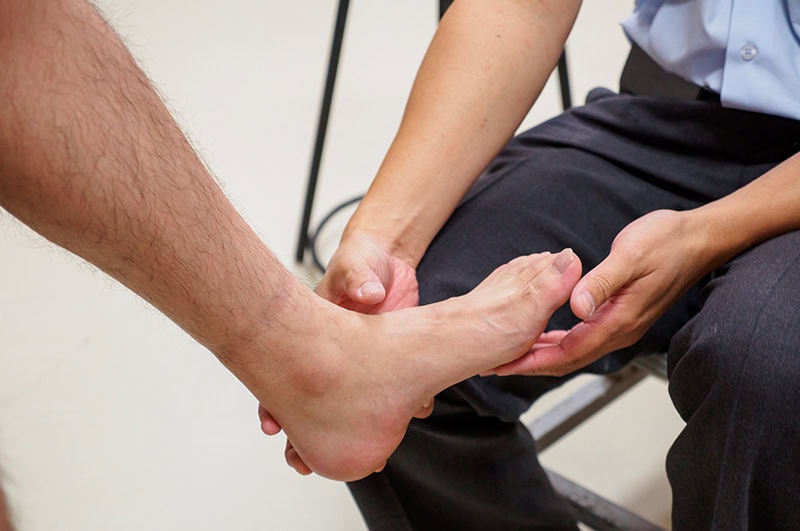Plantar Fasciitis
What is Plantar Fasciitis?
Plantar fasciitis is one of the most common causes of heel pain. It’s inflammation or degeneration of the plantar fascia – the thick band of tissue that supports the arch of your foot. The hallmark symptom is sharp pain in the heel, especially in the first few steps in the morning or after periods of rest.

Symptoms of Plantar Fasciitis
Plantar fasciitis pain develops gradually and is felt most in the heel. Common symptoms include:
- Sharp or stabbing pain at the bottom of the heel
- Pain that’s worse with the first steps in the morning or after resting
- Discomfort after prolonged standing or walking
- Tenderness along the arch or sole of the foot
- Stiffness that improves slightly with movement but returns after inactivity
The pain may ease once you’re moving but often flares up again after long periods of activity or rest.
What Causes Plantar Fasciitis?
Plantar fasciitis is caused by repeated stress and strain on the plantar fascia. Over time this stress causes small tears in the tissue and inflammation and discomfort. Contributing factors include:
- Flat feet, high arches or abnormal walking patterns
- Tight calf muscles or Achilles tendons
- Standing or walking for long periods, especially on hard surfaces
- Excess body weight
- Unsupportive footwear
- Sudden increase in physical activity
- Occupations that require prolonged standing or walking
Get Back on Your Feet
Heel pain can affect your work, exercise, and daily life. If you’re experiencing symptoms of plantar fasciitis, contact us to book an appointment and start your journey to recovery.
Plantar Fasciitis Diagnosis
A podiatrist can usually diagnose plantar fasciitis based on your symptoms and a physical exam. In some cases imaging (such as X-rays or ultrasound) may be used to rule out other causes of heel pain.

Plantar Fasciitis Treatment Options
Most cases of plantar fasciitis get better with conservative care. At Vale Podiatry we focus on non-surgical treatment methods tailored to your lifestyle and the severity of your condition. These may include:
Gentle stretching of the plantar fascia, Achilles tendon, and calf muscles can improve flexibility and reduce tension.
Reducing or modifying high-impact activities allows the tissue to heal.
Wearing a splint at night keeps the plantar fascia slightly stretched and prevents morning pain.
Shoes with good arch support and cushioning, along with custom orthotics can reduce pressure and correct mechanics.
To reduce pain and inflammation, we may recommend anti-inflammatory treatments. These can include non-steroidal medications (like ibuprofen) or corticosteroids, delivered either orally or through injection, depending on your needs.
When Surgery Is Considered
Plantar Fasciitis surgery is rarely needed and is only considered after several months of consistent failed conservative treatment. Surgical procedures involve releasing part of the plantar fascia to relieve tension and inflammation. Recovery times vary but usually involve a combination of rest, physical therapy and gradual return to activity.

Why Choose Vale Foot and Ankle?
At Vale Foot and Ankle, we provide full care for heel pain from diagnosis to long-term recovery. Our treatment plans are tailored to your lifestyle, activity level and condition severity. We emphasize conservative care but also provide surgical evaluations when needed.
Latest Posts

Is Bunion Surgery Painful? What to Expect Before, During, and After Surgery
Bunion surgery can be painful during recovery, but each individual’s pain can look very different

Stem Cell Injections for Plantar Fasciitis: What to Know Before You Decide
Plantar fasciitis is one condition that tends to disappear into the background, until it doesn’t.

Does Insurance Cover a Podiatrist Visit in Connecticut?
If you are dealing with foot pain or an ankle issue, the last thing you
